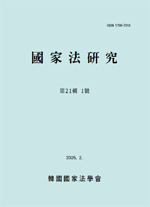대통령직의 특수성과 원활한 직무수행을 위해서 우리 헌법 제84조는 내란죄와 외환죄를 제외하고 대통령이 재직 중 형사 소추되지 않는 특권을 규정한다. 별도의 대통령에 대한 면책특권은 두고 있지 않다. 미국 헌법은 대통령의 불소추특권이나 면책특권을 명문으로 규정하고 있지 않다. 그러나 미국에서는 판례를 통하여 형성된 법리에 따라 일정한 범위에서 대통령의 면책특권(presidential immunity)이 인정되고 있다. 그동안 미연방대법원은 대통령의 면책특권에 관하여 몇몇 판례에서 법리를 형성해 왔는데, 2024년의 Trump v. US 판례에서 대통령의 면책특권의 범위를 넓게 해석하는 견해를 제시하였다. Trump v. US(2024) 판례는 대통령의 재직 중 공적인 위법행위가 임기 종료 후 형사 재판의 대상이 될 수 있는가 또는 면책특권의 적용 대상이 되는가를 다루고 있다. 우리헌법은 대통령에 대한 일반적인 면책특권은 인정하지 않고, 재직 중의 형사 불소추특권만 인정하고 있으므로, 미국과 논의 대상에 차이는 있다. 그러나 우리의 경우 불소추특권과 관련하여 대통령으로 당선되기 전 기소된 경우, 재직 중 대통령에 대한 재판 진행이 가능한가에 대하여 미국의 논의가 시사점을 줄 수 있다. 또한 우리나라에서 대통령의 재직 중 직무행위로 인해 민사상 손해배상책임이 인정될 수 있는가도 문제 된 바 있는데, 역시 미연방대법원의 관련 판례에서 시사점을 얻을 수 있을 것이다. 우리 헌법은 대통령에게 불소추특권만 인정하고 있으나. 미국처럼 법리상 판례를 통하여 새로운 대통령의 면책특권을 인정할 수 있는가도 검토해 볼 수 있다. 본 논문은 미국 연방대법원의 대통령의 면책권에 관한 판례를 2024년의 Trump v. US 판결을 중심으로 살펴보면서, 우리의 상황에 주는 시사점을 검토한 것이다.
In order to ensure the unique role of the presidency and the smooth performance of presidential duties, Article 84 of the Korean Constitution provides the President with immunity from criminal prosecution while in office, except in cases of insurrection or treason. However, it does not grant the President a separate form of immunity. The U.S. Constitution does not explicitly provide for presidential immunity or non-prosecution, but in the United States, a doctrine of presidential immunity has been recognized within certain limits through judicial precedents. Over the years, the U.S. Supreme Court has developed legal principles regarding presidential immunity through several landmark rulings. In the 2024 decision of Trump v. United States, the Court presented an interpretation that broadly defines the scope of presidential immunity. The Trump v. United States (2024) case addresses whether a former President can be subject to criminal prosecution for unlawful official acts committed during the term of office, or whether such acts are protected by presidential immunity. While the Korean Constitution does not recognize general presidential immunity and only grants immunity from criminal prosecution during a President's term, the U.S. case provides insights that may be relevant to Korea. For instance, in Korea, there has been debate over whether a criminal trial may proceed against a sitting President for charges filed before election. The U.S. legal discourse may offer comparative insights on this issue. Additionally, Korea has also faced legal questions over whether a President can be held civilly liable for official acts during the term. U.S. Supreme Court precedents may also shed light on such questions. Although the Korean Constitution grants only immunity from prosecution during the presidential term, it is worth considering whether a form of presidential immunity, as developed through judicial precedent in the U.S., could be recognized in Korea through legal interpretation. This paper examines the U.S. Supreme Court’s case law on presidential immunity, with a focus on the 2024 Trump v. United States decision, and explores the implications for Korea’s constitutional and legal framework.
Ⅰ. 머리말
Ⅱ. 미연방대법원 판례의 연혁
Ⅲ. 미연방대법원의 Trump v. US (2024) 판결
Ⅳ. 우리나라의 대통령 면책특권 논의와 시사점
Ⅴ. 맺음말
(0)
(0)
